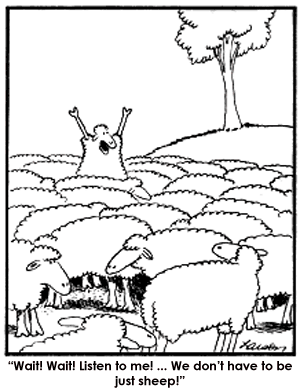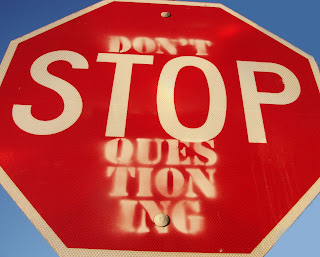Occam's Razor, otherwise known as 'lex parsimoniae' (the
Law of Succinctness) is one of my favorite guiding principles. There is a great deal to be learned from applying Occam's Razor, and I think the process of education reform could use a healthy dose of this principle.
According to Wikipedia, the principle of
Occam's Razor is attributed to 14th-century English logician, theologian and Franciscan friar, William of Ockham. It is the meta-theoretical principle that "entities must not be multiplied beyond necessity" and the conclusion thereof, that the simplest solution is usually the correct one. We don't tend to lean toward principles like Occam's Razor in education, especially under
Third Way structures that have dominated the teaching profession for the last number of years. As a result of the seemingly perpetual top-down quest for higher student achievement, teachers have been spooked, and for good reason. This past February, the entire school staff at
Central Falls High School in Rhode Island, USA was fired as a result of low student achievement. We have become so engrossed as an institution with externally-applied standards of education, that any regard for decentralized autonomy and customization of teaching and learning to suit local needs has simply disappeared. Government education departments have become so intently focused on standardizing the education system using high-stakes testing processes and statistical analysis that they don't even seem to be aware of the infinite alternatives to the game of natural selection they think they're playing.
This post is about getting back to a routine in education that observes a localized need for learning; one that makes adjustments in real-time according to that need, and that understands there is more than one way to climb a mountain. Every school is different. Even schools from within the same school district have identifiable characteristics that set them apart from all the others. If you don't believe me, ask a substitute teacher who regularly works in different schools within the same district how they feel about their time in the different schools they teach within. It's remarkable how varied their descriptions will be, even between schools that are mere blocks away from each other in the same neighborhood. Every school has its own culture; it's own identity as defined by the unique individual teachers and students that spend their time there. This reality does not appear to favor a unilateral approach to the management of learning that is so prevalent in contemporary education.
So what is the alternative? I would argue there is more than one alternative; in fact there is no end to the alternatives. Do we need standards in education? Yes. One would be ignorant to assert otherwise. Here's where Occam's Razor comes in. Our tendency to
multiply entities beyond necessity has been drummed into us in our never-ending quest to find the latest and greatest strategy that will raise those all-important test scores. We have completely forgotten that the simplest solution is usually the correct one. "Less is more, less is more"... we need to drum this into our heads until it resonates louder than the current
more is more perspective that so many teachers subscribe to.
I envision a curriculum that removes all overflow and gets down to the critical, timeless and core elements of knowledge within each subject area. Once grounded in this core pedagogy, let's let the teachers adjust and customize their instruction to fit the group they're teaching at any given time... that's what they are trained to do, and I would argue strongly that it's also what puts the passion back into their purpose.
Let's remove subjects like music, art, health (and any other that is currently set aside as a supplemental class) and immerse these fine art elements into everything kids do in school. Why can't a music specialist teach alongside the classroom teacher providing musical expertise during math (can you think of a more natural way to add interest and fun to math class?) or social studies or language class? I have never understood why these subject areas are taught in isolation- it's an
unnatural multiplication of entity beyond necessity.
Let's understand that to kids, life is simple. Kids just are. They experience everything in such visceral ways, and we take that away from them in school. So many teachers (perhaps adults in general) have become so wound up in the official world that we've lost our ability to see the real world through child's eyes... the world that should be amplified in schools through any means possible, and there are so many possibilities. Let's stop paying lip service to "meeting kids where they're at" and actually meet them where they're at; this wonderful place where everything is new and spectacular and worth looking at for hours as long as no adult comes by to hurry them along. Let's try to remember that, in the immortal words of Henry David Thoreau, "all change is a miracle to contemplate; but it is a miracle which is taking place every second." These words encapsulate perfectly the perspective of a child... the one that believes a miracle takes place every second, and I think, learning in general as perpetual inquiry and discovery.
Let's use technology as a value-added element of education, and not just for the sake of learning how to use technology. I'm of the opinion that technology should be omnipresent in our schools, not as an alternative to more traditional learning tools, but as a supplement to them. There will always be a mystique attached to reading a good old-fashioned book, and there will always be excitement created when kids build stuff in three dimensions using their hands and whatever can be found... but if we can show kids that e-readers and 3D digital representations are cool too, all the better.
Let's understand that teachers know best regarding where their students academic abilities and challenges lie. Given this understanding, it makes sense that assessment should be based on this insight. Teachers would appreciate more latitude to exercise the creative ways they know how to use formative assessment practices designed to develop understanding of those core curriculum principles I was referring to earlier. If we want our students to display an inquisitive and creative perspective, then we critically need opportunities to model that for them. We need to practice what we preach regarding our style of instruction and assessment to reflect a culture of inquiry and discovery for both teachers and students in our schools.
There are so many ways we can change to make education better; these suggestions are but a few. I've got ears for anyone, anytime who wants to add to this list. The only rule is that whatever the idea, it has to be seeded in the philosophy that less is more, and that the simplest and quickest path to wonderment in education is always the best. Once you set off on this path, the kids will take it from there.









